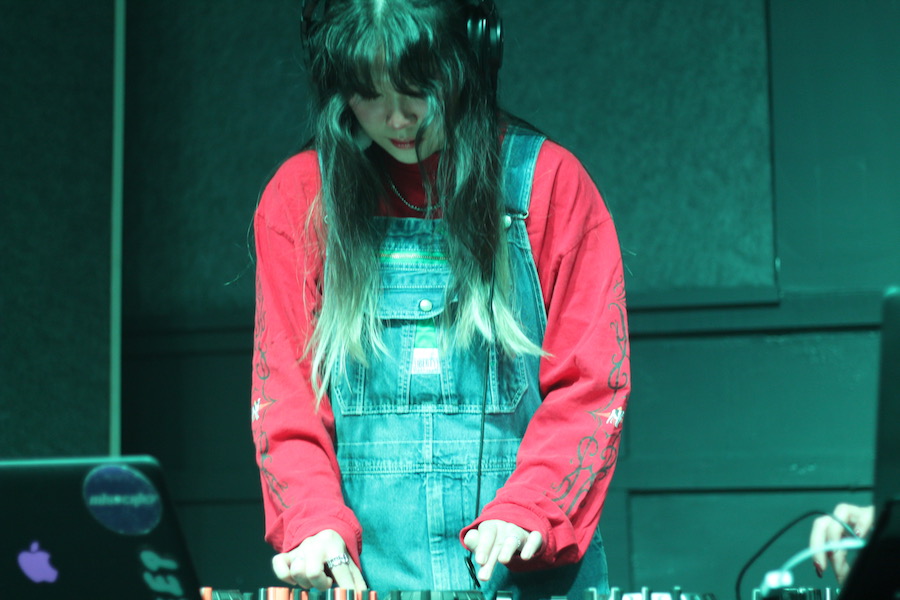
Music | Arts & Culture | The State House

| Elaine Lou, who goes by the stage name DJ moong!rl. Lou said her influences include trance from the 1990s and early 2000s, garage, drum and base, and Footwork, a genre that comes singularity out of Chicago. Lucy Gellman Photos. |
At the front of The State House, DJ moong!rl had the room waiting for the downbeat. She pumped her arms, her t-shirt glowing red under a rotating wheel of bright light. A beam of purple passed over her, replaced with green in just seconds. Beyond the stage, the downbeat came with a heartbeat-like thud, and the audience kept moving to the music.
Moong!rl is a member of Miss/chief, a DJ collective for women and non-binary people of color that brought out a crowd to The State House Thursday night. Founded by Raquel Bräu Díaz (DJ RAQX) in August 2017, the collective comprises current and former Yale students, as well as Wesleyan University alum Kafilah Muhammad (DJ Kfeelz). It is now spread across New Haven, Muhammad’s home of New York City, and Mexico, where Bräu Díaz is doing a Fulbright Fellowship.
Thursday, members Elaine Lou (DJ moong!rl), Edwina Kisanga (DJ Rx) and Kat Wang (DJ kat.offline) brought a fiery dance party to the State Street venue, with influences ranging from 1990s trance and Detroit techno to Afro-soul and Reggaeton. As the place filled up, bodies relaxed on the dance floor, finding their spines and arms, rolling their shoulders, bending at the waist.
Before the set, The Arts Paper had a chance to sit down with the three to talk about how the collective has grown, and where it wants to go next. That interview is below.

Lucy Gellman: So tell me about your origin story.
Wang: Raquel was the one who first introduced me to DJing. I was first brought into the group as someone who was interested, and then Raquel shared her skills and shared resources, and I wouldn’t be here without her. There was a lot of intentionality in who was going to be brought in, and who was going to uplift each other.
We initially started DJing predominately for Yale students—the scope initially was very small. Raquel had been DJing for a while, and found that they were mostly cis white men. And wanted to find community within her own hobbies and interests and brought them all together.
What’s that like? Because Yale is—well, it’s a whole thing.
Lou: I had wanted to learn how to DJ since I was in high school. It, for me, was super empowering to be part of a collective that was all women of color and POC. It allows for a type of expression and camaraderie that we wouldn’t have otherwise. Like, Yale DJs is an organization that was recently founded, and even though that’s there, I’m extremely happy that I have you guys, just because I don’t think it would be the same.
Even beyond that, it has allowed me to explore my music tastes, and how they fit into spaces other than the Yale scene, which can be limiting sometimes. There’s plenty of opportunities and evens to play here, but I think the collective has given us the ability to reach venues and audiences in New York, which is a dream.
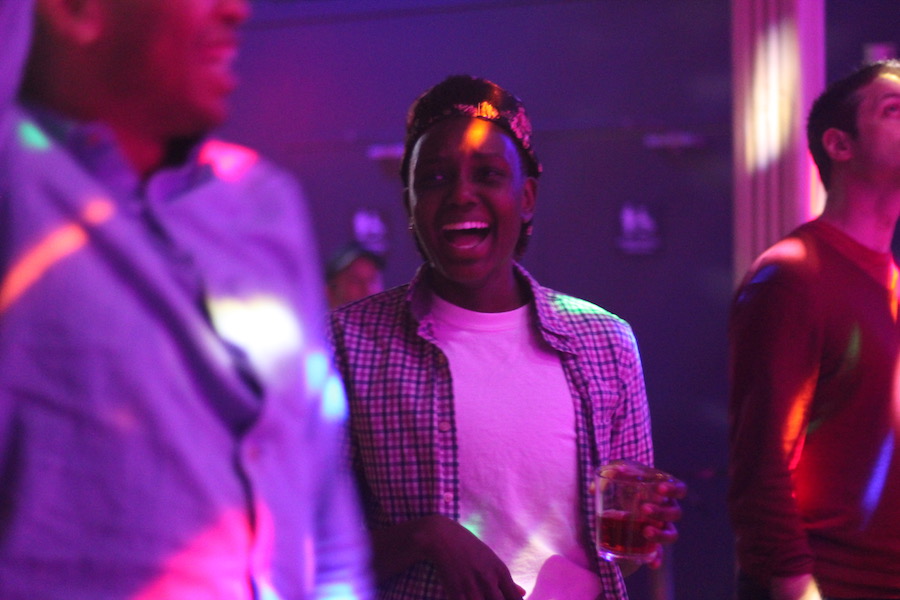
| Edwina Kisanga (DJ Rx). A first-generation South Sudanese-American who studied Molecular Biophysics and Biochemistry at Yale, they said their influences include Reggaeton, hip-hop, and Afro-soul. "I try to make sure that everyone has something that they can love," they said. |
Is it a lot of sort of hopping between spaces?
Wang: Yeah, absolutely! I think the longer that we’ve DJed, the more intentional we’ve been about the spaces that we’re comfortable DJing in. Increasingly, I think what the group prioritized when we got together was artistic expression, and oftentimes DJing can be a sort of commodified hobby. A lot of people do it for either the visibility of being a DJ in spaces, for the clout, and it’s a position that’s often seen as catering to the audience that you’re playing for.
For us, we pursued it as a means of artistic expression. In that way, I think we are a lot more conscious about the music that we want to play and the environment that we want to create through music. I think that has been made very clear with the audience that comes to see us perform. Oftentimes, they’re not coming with a set expectation of what they’re going to hear, but they’re there for the experience.
We’ve previously played spaces where there’s expectation for what kind of music will be present, and in those spaces we’ve felt really restrained with our artistry.
Kisanga: We all come from very different backgrounds, and we all have very different musical tastes. And so coming to a Miss/chief event, you never really know what you’re going to hear. And so we really prioritize spaces that allow us to be our truest and fullest selves.
So I want to to unpack that a little bit. I did not go to Yale, but I worked for Yale, and that was an education. I can imagine that you come into this university that both serves and takes care of its undergraduates, but still has a very white supremacist, very imperialist mentality. So what is navigating that?
Lou: For me, the thing that comes to mind immediately is an anecdote that me and Edwina has where a frat tried to pay us $25 for three hours of DJing … and they asked us on the day of. It was me and Edwina who were going to potentially do it, and then we asked compensation and they offered us $25. In total.
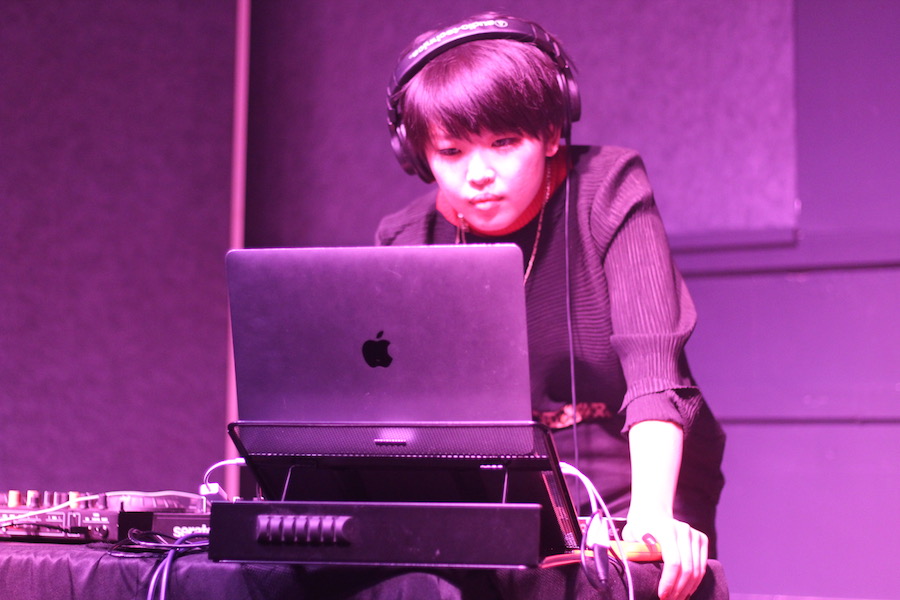
| Kat Wang, DJ name kat.offline. Wang said her biggest influences are Detroit techno and Chicago house. |
That’s like $4.20 per person per hour.
Lou: Right! Add in the fact that the audiences was one of the least audiences I would want to play to. It was just ridiculous. I remember laughing out loud. So there’s incidences like that.
If it’s not an event that we’re curating and we’re designing totally ourselves, oftentimes the audience can feel oppressive in what they want to hear. Then again, that could also be not just a Yale thing. That could be a public audiences thing.
Kisanga: The thing that has helped me navigate Yale the most is finding communities and spaces where I feel empowered and I feel comfortable. In undergrad, I was in the Shades of Yale, which is this a cappella group that sings music of the African diaspora and of the African-American tradition. Typically, the makeup of the group is predominately underrepresented minorities. So having that space where we’re literally on stage, in front of Yale, making our voices heard, that was something that really spoke to me and helped me become the person and the musician that I am today.
In the sets that I play for Miss/chief, I prioritize black and brown voices, music by black and brown artists. Having Shades and other communities like Shades at Yale, and also having communities like Miss/chief in New Haven has been really really healthy and good for me.
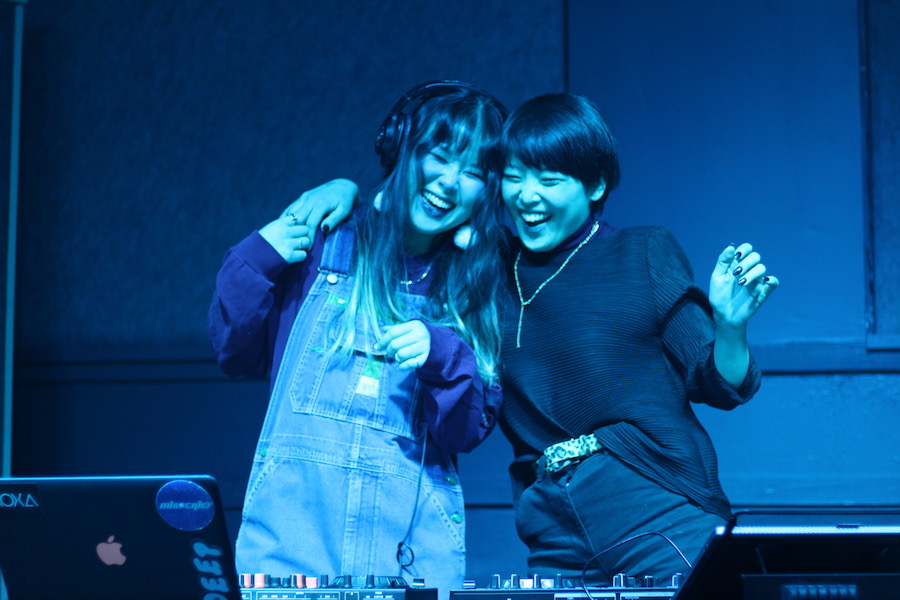
Let’s talk more about these spaces, where women and non-binary folks and people of color are saying: We’re going to be deliberate about lifting each other up and creating this space.
Lou: I have another anecdote. We threw a party in a traditional campus space … at the end of last year. And that was one that we totally curated. It was all of us there except for Raquel, and it was our event.
Even a couple weeks ago, someone was telling me about how different it felt than the normal standard of Yale parties. People stayed longer. There was more of a communal good vibe. People wanted to stay. And it was like … I felt that there was more love in the air than I’ve ever felt at a fraternity.
Wang: I also think a huge part of it is what it means to be visible in a space that is traditionally not uplifting those underrepresented minorities. Going back to the fact that Raquel had taught me this skill—the only reason I was able to do that was because someone who is also a woman of color guided me through the process and showed me it was feasible. I think that is both the visibility of the act, but also what it means to find camaraderie in a shared hobby, shared space. And feeling like my instincts and my voice were valid to be heard in those spaces.
Something that we’ve found in the spaces that we’ve played is that people go for the intention of listening to the music, and they go for the intention of dancing. I think that’s oftentimes not the case in many social spaces, and many college social spaces, in general. I think that those spaces can be really sexually predatory. That’s something that we’re very aware of, and also make very clear that those sorts of intents and actions are prohibited. You will be asked to leave if you are seen engaging in that behavior.
Kisanga: Leave your -isms and your phobias at home! Don’t come.
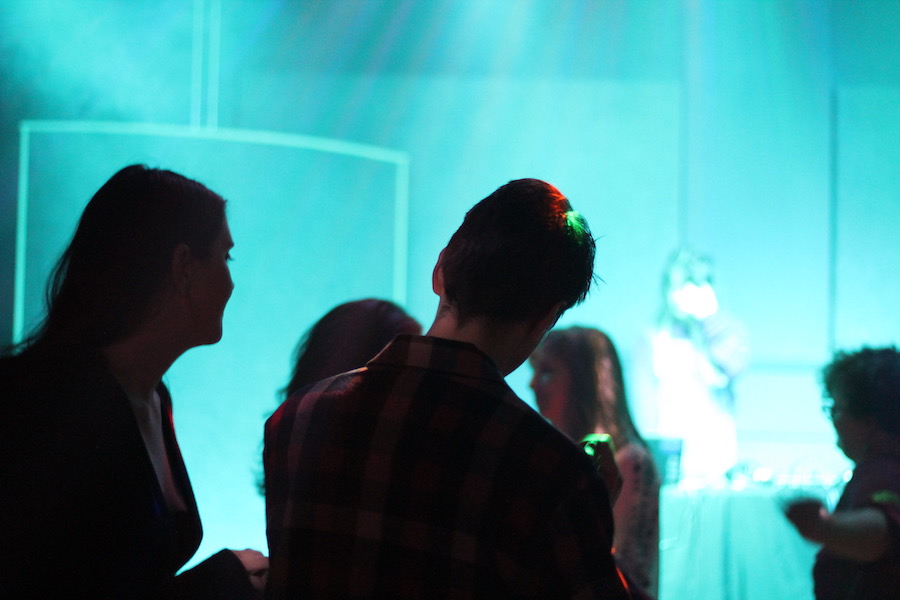
So there are five members. Have you found that it’s sort of fluid, then?
Wang: I think that regardless of where we are, regardless of the geographical place that we are located, we are oftentimes sharing experiences, talking with one another, sharing music. We typically chat with each other at least once a week.
Only Elaine and I are still undergrads, so where we’re going to be is really up in the air, but I think that knowing that there are people that are consistently sharing my experience, regardless of where I’m at, I feel supported. It also means that the expanse of our network is constantly increasing. The people that we know and the communities that we share is always increasing collectively … I know that wherever we go, we have connections.
Even if I’m not present, anyone that I know in this collective can connect to the people that I’ve met globally. And I think that’s really important. Though our group has stayed the same, the places that we’ve been have been really fluid. So the globalizing factor is really exciting—that wherever you go, there’s going to be somebody that’s really excited to support you in places that you’re at. We’ve found a lot of kinship in Connecticut local artists.
Kisanga: Honestly, shoutout to all the local Connecticut musicians as well [they were introduced to The State House through musician Trey Moore], because they’re doing some really incredible work here.
I think some people see a DJ performing, and they really don’t think there’s artistry and labor to it. How have you all countered that?
Wang: Showing them! Really, bringing them to events. Both the experience of listening, and the experience of being in a space that is so much about the immersion of yourself in all the sensations of going out and partying and listening to really great music that moves your body. It almost becomes a meditative experience when someone is really intentionally curating what they’re playing, and being very conscious of the momentum of their music.
That has been one of the most convincing factors for people who are questioning the validity of what we’re doing. We never went into this imagining it would be as big as it has been, or that our name would have traveled as far as it has.
Lou: I just thought I was gonna meet some cool friends. This is that, and a lot more. A lot more.

